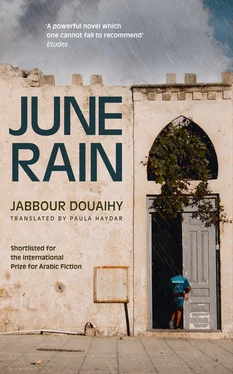Suddenly the fat lady started complaining to herself, in a loud voice. She spoke without looking at anyone. She hadn’t been able to find her identity card. She’d come to the barracks without any proof of who she was. When the Sûreté Générale officer had come to everyone’s house he told us to arrive before noon on Saturday at the Michel Hlayel barracks in Qubbah and to bring our identity cards. We hadn’t waited until before noon, but started heading to the barracks in the early hours after dawn and arrived even before the members of the committee coming from Beirut. The Sûreté Générale officer hadn’t said more than that; he asked only for our identity cards. The fat lady had lost hers. She woke up early that day and turned the house upside down looking for it for the third time. She hadn’t used it since the last election. I hadn’t yet understood this ability some people have to speak to themselves in a loud voice without addressing anyone in particular. When she first realised that she’d lost her ID, she had gone to the Civil Registry Office to try to obtain a new one, but the officer told her it would take time. Suddenly she changed her tone, as if to console herself, telling herself she would surely find someone to vouch for her.
‘My sister is here, and my nieces, but I don’t see them anywhere. Maybe they haven’t arrived yet. If they send me back home empty-handed, I’ll raise hell!’
Suddenly she spotted one of her relatives at the rear, so she called out to him as if she hadn’t seen him for ages; mainly to console herself that there was someone who knew her who was prepared to identify her.
I had no desire to come to the Michel Hlayel barracks in Qubbah, but my brother persuaded me with a simple plea: ‘If you don’t take the money allocated to you, they’ll take it instead.’
The ‘they’ he was referring to were the members of the committee or some officials we didn’t know. They’d take it and pocket it themselves. ‘At any rate,’ he added, ‘your generosity in the matter would go unnoticed by everyone but the two of us…’
Actually, I hadn’t been thinking about generosity. I was thinking about my uncle’s wife. As far as I knew, she didn’t even know where we lived. Never once had she come to our house for a visit. It was like the endless war of Dahis and Al-Ghabraa between us. We believed that our uncle loved us but she had turned him against us. I remember how he used to wait until her back was turned to give us money and tell us to hide it from her. He’d kiss me on the forehead and I could smell tobacco on his breath. We were little and he loved us. We were his brother’s children, so we were his children too. That’s what he used to say while I nearly gagged from the smell of tobacco reeking out of his jacket.
‘They want to take your inheritance while you’re still alive…’ That was her call to war against us. And we used to answer back. We weren’t shy about it, and our answer was harsh. We went back and forth with it at length at home. ‘Why didn’t she give him some children who could inherit from him? We’re not going to let you take our property to your family! If only my uncle could see, he wouldn’t have picked her up off the street!’
But her influence over him was much stronger than ours. He loved to eat and she used to threaten him that if he was nice to us she’d stop cooking for him. He loved baked spicy fish and stuffed tripe and grape leaves, and she was a very good cook. In any case, she was going to kill him with all that food. Once, and only once, she invited us to lunch. The bitch was a damn good cook! Eventually, she forbade him from visiting us and the enmity between us grew to the point where he started saying things like, ‘If I die I don’t want them walking in my funeral procession.’
Some people told us they’d heard him say that. He didn’t want us — my brother and mother and me — to walk in his funeral procession. I couldn’t believe he would say such a thing.
And now here we were, standing in line outside the army barracks for the sole reason that we were his nephews. My mother had forced me to take a sandwich of cheese and olives that she made and wrapped in a paper bag for me. I almost gave it to the Ghandour so he might give me a break and give himself a break from all his talking. My mother worried I would get hungry if there was a long wait. ‘You can’t stand being hungry,’ she said to me. She knew me well, my mother. I really can’t stand being hungry. But I was embarrassed by the bag and the cheese that was starting to stink. And I was embarrassed about my uncle’s wife, too. She’d be livid if she saw us standing in line.
I was trying my best to hide behind the fat lady blocking my view, but my head still stuck out no matter how hard I tried because she was short. The sun started to beat down on us as we inched slowly forward. We were dying to know what was happening inside that small building. Those exiting didn’t encounter those entering. The news travelled, though, in the end, from the back of the line to the front this time. There were people who’d made the full round and then returned to the end of the line holding something others could see. Many of them were holding a banker’s cheque in their hands for the very first time. At first, we didn’t understand how they’d divided up the money as the shares weren’t equal. Eventually we figured out that they had divided it up according to each heir’s share of the dead man’s inheritance.
The truth was I was embarrassed to be there and tried to avoid people’s eyes — people I knew. I knew what they would say to themselves if they saw me there with my brother. My brother, on the other hand, didn’t really care about all that. I spotted him joking with the people standing next to him in line. Everyone had been included in the inheritance, without exception, and they all had come. Half the town was there. The Ghandour looked them over and told me about each one.
‘See that woman there in front of the soldier with the glasses? It was my brother Nassif who killed her husband. If it hadn’t been for my brother Nassif, it would have been a huge disgrace for us at Burj al-Hawa. They shot her husband from behind, because his relatives didn’t protect his back…’
They had made all of us come to the barracks and stand together in one line. It was the first time we’d come in contact with each other after the events. Two years earlier when the government took control of the situation and arrested men on both sides, guilty and innocent alike, they separated us, putting the Semaanis in the Qubbah prison and the Ramis in the Amir Bashir army barracks in Beirut. But this time they put us all in one line.
Abu Jamil passed next to me and put his hand on my shoulder. The way he looked at me made me feel he still loved me, the way he used to love me when he was in our quarter. That was before he fled and some of our family members occupied his house.
‘Tell your mother,’ he said to me, ‘that Umm Jamil says hello.’
I told my mother that when I got home. She sighed.
The Ghandour knew every one of them. ‘And that young man over there,’ the Ghandour continued. ‘My brother Nassif…’ None of his talk was about himself; the true hero in his eyes was his brother Nassif.
I put my hand over my ear trying to get his mouth away from me.
My uncle’s wife got half of the inheritance and we got the other half. If they’d had children, we wouldn’t have received anything. My uncle had run into an ambush that hadn’t been intended for him. He had been driving along in his car when he heard shots fired nearby. Startled, he lost control of the car, veered off the road, and his car flipped and ended up at the bottom of the valley. Despite that he didn’t die; people said he got out of the wrecked car and walked away. They didn’t find any evidence of bullet holes in the car, though. At any rate, the people who had set the trap on the road were from our side, and when they discovered their mistake they rushed to get my uncle out of the car. Be that as it may, my uncle’s health went downhill after that and he died six months later. We attended his funeral service at the church, but we didn’t go to the house afterwards because his wife sent someone to tell us she would cause a scene if we entered her house. She came at us with everything she had. Everywhere she went, she said that we had done everything in our power to prevent him from being listed among the victims of the fighting and that we had gone to the military commander to tell him our uncle died in a car accident and his wife wasn’t entitled to compensation.
Читать дальше












